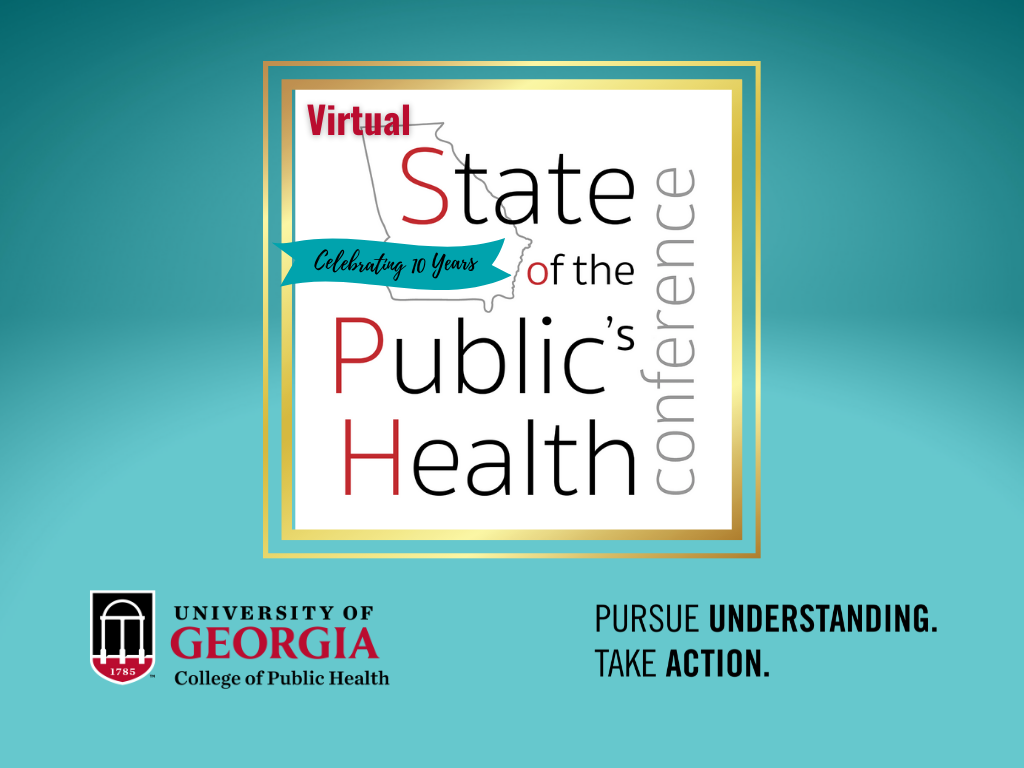The University of Georgia’s College of Public Health (CPH) hosted its tenth annual State of the Public’s Health Conference virtually on October 14.
For ten years, the conference has brought together professionals across multiple disciplines and sectors to drive discussions and inspire action to improve the health of Georgia communities.
Marsha Davis, dean of the UGA College of Public Health and conference founder, says the mission of the conference is to move public health forward in Georgia.
“More than dwelling on the challenges of the day and problems of the past, the State of Public’s Health Conference is focused on paving the path for Georgia’s future,” said Davis, in her opening remarks to attendees. “We hope you will join today with other public health professionals for a relevant, grounded and practical dialogue about public health in Georgia.”
This year’s program featured discussions about mental health, salient health issues affecting rural Georgia, public health law, and COVID-19’s impact on Asian American, Native Hawaiian and Pacific Islanders communities.
“The conference provides an annual forum for us to take a deep breath and feel a moment of sincere gratitude for our profession and the community we have in one another, and to celebrate the work of public health in our state despite tremendous challenges during the pandemic,” said conference host Grace Bagwell Adams, CPH’s assistant dean of outreach, engagement, and equity.
Mental health policy expert Ben Miller was the keynote speaker.
Miller, who serves as president of the mental health advocacy non-profit organization Well Being Trust, stressed that not having a vision for better mental health care reinforces the status quo.
To achieve progress on mental health, Miller said, states must embrace a comprehensive framework that “begins in community and extends into healthcare.”
“If we’re serious about tackling mental health and addiction in our country, we must leverage all the places that people present with needs and provide support accordingly. Bring mental health to where people are – from schools to prisons to primary care,” he said.
Integrating mental health care into primary care and addressing roots of chronic stress like poverty are critical to improving mental health and addiction outcomes in Georgia and all U.S. states, said Miller.
Addressing systemic barriers to health, community-based problem solving and the power of collaboration were themes that appeared in presentations throughout the conference. View full recordings of the conference breakout presentations here.
Community activist and spoken word artist Lemuel “Life” Laroche performed a spoken word poem called, “Project,” which emphasized the power of compassion and connection, and the hard work of recognizing what communities really need to thrive.
Yvette Daniels, director of university relations for the Georgia Department of Public Health, closed the conference with a reflection on ten years of partnership between DPH and Georgia universities.
“How do we help the next generation of public health workers see how they can fit and bring their gifts and their skills and their insight into the world of public health locally and at the state level?” she asked.
She encouraged public health professionals to connect with students and nurture their interests in public health work. And, she echoed the need for professionals to be open to growing pains and show compassion to others in difficult times.
“Finally, I would say, be hopeful. Talking with students, talking with public health professionals, talking with our partners – everyone wants to do what’s good and right for the state, this community and for public health overall,” she said.
“And I really think there’s great hope for all of us in the future.”
The College of Public Health will continue to grow the conference as a forum for nurturing statewide efforts to transform the health of communities.
– Lauren Baggett
Posted on October 20, 2021.







